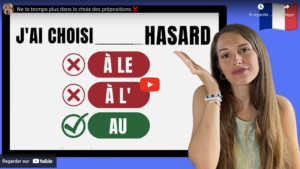Transcript
"Among" is always, always, used without "s".
I come to sing you the ballad, the ballad of happy people. Hi everyone, welcome to this new French video.
As you know, French is a very difficult language, with many rules and many exceptions. The French themselves, when writing, occasionally and even often ask questions about the spelling of certain words or about grammar. Today, we're going to take a look at the top ten queries on the Internet concerning French spelling or grammar rules.
🚀 Transform your understanding of French IN 15 MINUTES A DAY
60 dialogues to boost your understanding of French 🇫🇷
To make this video, I based myself on a study carried out in 2019 called the "Voltaire barometer". I'll put the source in the video description. Before I start, I'd like to tell you about the sponsor of this video, who's called Neeva.
As you know, it's thanks to our sponsors that I'm able to continue making quality videos. Neeva is an ad-free, private search engine that you can use for free.
When you use a conventional search engine, there's a lot of advertising, and it can be difficult for us to know which sites are really interesting and which have paid to be there. Neeva is also private, which means it doesn't follow your path. When you're on a conventional search engine and, for example, you're looking to buy a vacuum cleaner. I guess you've already noticed. Then, when you go to other sites, you're going to get ads for vacuum cleaners because search engines are going to share your searches, share your data with advertisers, with sites.
Neeva doesn't do that. This search engine has other features that I personally find really interesting. When you make a search, you can tell the search engine whether you're very interested in this site or not. In this way, it learns what you like, so that it can offer you more interesting results.
When you do a search, for example on a medical subject, you can filter the sites that will appear. For example, you can choose to see only institutional sites.
You also have a space where you can classify your favorite sites. For example, I've put together a progressive directory of sites I find interesting. You can add this search engine as an extension to your Chrome or Firefox browser, or download it as an application for your Android or iOS phone.
Let's return to the top ten spelling questions on the Internet.
The first is "can we? "Can we?" or "Can we? When you ask a question, when you make an interrogative sentence with a question mark, you're going to invert the verb and the subject, and you must systematically put a hyphen. This is always the case. If you invert the verb and the subject, you need a hyphen. For example, if I say "Can you learn French in your sleep?
You need to put a hyphen between "can" and "on". The subject of this sentence is in the third person singular "on", so "may" will of course be spelled with a "t". There's no such thing as an "x" ending in the third person singular.
So can we use a "t" and a hyphen?
The second question many people ask is about, of course. Can it be written in one word? Can it be written in two words? Does it need a circumflex accent on the u?
Can I have a glass of water? Sure, make yourself at home. Of course is always written in two words. And when "sur" is an adjective synonymous with certain, that's sure and certain, we always put a circumflex accent, precisely to distinguish it from the preposition "sur". For example, "I'm on the terrace". On the other hand, "I'm sure of myself with a hat on".
The third request we're going to look at is time for me. It's one of the most debated types of writing. Au temps pour moi means "my bad" in English. So it's used to acknowledge that you've said or made a mistake. I passed all my exams, except for geography. Oh no, my mistake, I also failed sport. The only spelling validated by the French Academy is "au temps" T E M P S.
The origin of au temps comes from a military expression used when a soldier didn't make his move on time, and had to be restarted from the beginning.
Ride with one "L" or ride with two "Ls"?
This one, I don't know why, I can never remember it. Every time I have to write the word "balade", I go back and look it up on the internet.
Both are correct with one "L" and with two "Ls", but they don't mean the same thing. A walk with an "L" means a stroll. I go for a walk with my dog or I go for a walk in the mountains.
Ballade with two "Ls" is used to refer to a musical or poetic work. I'm playing a ballad on my guitar. You may be familiar with this music. I've come to sing you the ballad, the ballad of the happy people. To help you remember, if you need one "L" or two "Ls", you can use this. When you like a piece of music, it's very hard not to listen to it twice.
Let's move on to "among" or "parmis".
Do you spell it with an "S" or without an "S"?
Well, it may seem illogical, because it's always used with a plural, or at least a singular, but which has a collective value. But "among" as a preposition is always, always, always used without "S".
There is no "s" in parmi. Parmi means among, in. Of all the singers, Beyoncé is my favorite. I'm looking for my friend in the crowd.
Welcome with an "E" or without an "E"?
Both spellings are correct, but we don't use them in the same way. When you want to welcome someone by showing joy, or several people, you should write "bienvenue" with an "E".
Bienvenue is always written with the U E ending. Even if you're talking to several people, if you're talking to a boy, it's always U E because what's implied is "I welcome you" or "I welcome you". It's a noun and it's invariable, la bienvenue. For example, I can say welcome to the channel's new subscribers.
By the way, if you haven't subscribed yet, don't forget to do so right away and activate the bell so you don't miss any of my videos. On the other hand, "welcome" can also be used as a noun to describe someone or something that is welcomed with joy.
Breakfast would be nice, I'm very hungry. So here, on the other hand, it will change in gender and number. "Welcome" can also be used as an adjective. For example, an increase would be welcome because the cost of petrol has gone up. Your opinion would be welcome, I don't know which car to choose. This adjective is used to refer to something that would come at the right time. So it would be necessary at that moment.
The seventh most popular query is "when" with a "D" or a "T".
Again, both spellings are correct, but the two words don't mean the same thing. Quand with a "D" is a synonym for lorsque. There's a notion of time. When I was a kid, I wanted to be an astronaut. If you can replace it with "when", then it's a "D".
When I was a kid, I wanted to be an astronaut. When "when" is used in questions, then you can replace it with "when?"
When do you go on vacation? When do you go on vacation? That's a "D". Quant with a t means "with regard to".
As for my vacations, I will leave in July. As for her skirt, I find it beautiful. As for my vacations, I am going in July. As for her skirt, it is beautiful.
The next is "au vu de" with an "e" in "vu" or without an "E".
"Au vu de" is always written "V U". It is an invariable expression. It means, in view of. You can also replace it with étant donné. In view of my grades, I'm going to repeat the year. Given my grades, I'm going to repeat. People often put an "E" in "vue" because they confuse it with another expression. They confuse "au vu de" with "en vue de". En vue d'eux means in order to, with a view to.
In order to participate in The Voice, I take singing lessons. So in order to participate in The Voice, I take singing lessons.
Diagnosis with a "C" or "QUE" for ending. When we talk about the name, a diagnosis, that a doctor will make, we always write it with a "C". So a diagnosis is made when we explain the symptoms of an illness. For example, if I say my right ear hurts, my head hurts and I have a fever. The doctor might say "the diagnosis is...you have an ear infection".
On the other hand, of course, you know, French is never simple. The verb "diagnostiquer" (to diagnose) is properly spelled "Q U E R" as an ending. So he diagnoses, if I say, the doctor diagnoses an ear infection, then we'll write it with "Q U E".
Let's move on to the 10ᵉ most searched query. I send you, "O I E" or "O I S"?
So it's very important to understand that "to send" is not the same as "to see".
"Send" is a first-group verb ending in "ER", which is not the case for "see". First-group verbs in the first person singular of the present indicative always end in "E".
I send, "O I E". So the "O I S" ending doesn't exist at all. We'll write j'envoie 'O I E ", tu envoie " O I E S ", il envoie " O I E " et cetera.
That's it for today. I hope you enjoyed this video. If you liked it, of course, put a j'aime and if you're not yet a subscriber, subscribe right away.
See you soon.








